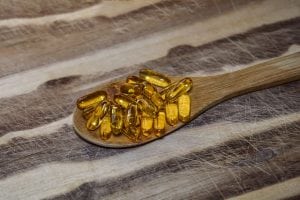The Skinny on Omega 3 Fatty Acids

Image courtesy of Pixabay
If you haven’t heard that omega- 3 fatty acids are good for you, you’ve not been paying attention. Two crucial omega- 3s are primarily found in certain fish. ALA (alpha-linolenic acid), another omega-3 fatty acid, is found in plant sources such as nuts, seeds and even leafy greens like cabbage. Not only does your body need these fatty acids to function, but also they might deliver some big health benefits like improving heart and brain health and curbing the pain and stiffness of arthritis.
If you don’t get enough omega-3-rich foods in your diet, you may be thinking about a dietary supplement. Here’s why that’s not a great idea.
We don’t know what we don’t know. In regard to supplementation, we don’t really know if supplementing vitamins or other nutrients is as effective as eating foods that contain them. To paraphrase Paul Greenberg, author of The Four Fish, we haven’t seen big studies come out that say very clearly one way or the other, that taking a supplement helps us.
The way we harvest omega- 3 for supplementation is not environmentally sustainable. Omega-3 supplements come from pelagic fish. These are silvery, little fish like anchovies and herring, that are really essential for ecosystem dynamics in the ocean.
According to Greenburg, “The way that oceans work is that all the energies coming from the sun and all that energy is processed by plankton, by phytoplankton.” The little fish that are used for omega-3 supplements transfer the energy from plankton to larger fish. If you harvest the middle layer of the food chain, the benefit does not get passed up, which is harmful to the health of the oceans. The fish that are harvested by the supplement industry are keystone species. They are essential for growing larger fish and, if we remove those smaller fish from the system, we’ll see fewer bigger fish.
You can get adequate omega-3 for good health from anchovies and herring. They are extremely high in nutrients and tend to be quite low in mercury and contaminants. Environmentally speaking, harvesting an anchovy or herring requires very little carbon. Eating these fish instead of using them to make supplements would reduce the likelihood of overfishing these species. Mussels, clams, and oysters are also high in omega-3 fatty acids and actually improve the marine environment even as we grow them. They filter the water, make it cleaner, and provide structure for all sorts of other animals to exist.








